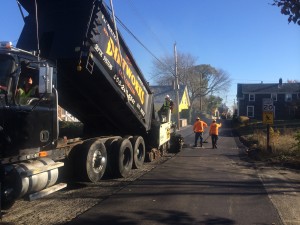Asphalt – How Thick Should It Be?
Asphalt – How Thick Should It Be?
 Full-depth asphalt is an excellent choice for a variety of pavement types. It is economical and fast to install, but it is remarkably long-lasting, aesthetically pleasing and flexible but strong. Many people, especially those who know that the thickness of concrete pavement plays a vital role in its strength and load-bearing capabilities, assume that it is always best to have asphalt pavement built as thick as possible. However, this is not necessarily the case. There are other factors that are at least as important as the thickness of the asphalt.
Full-depth asphalt is an excellent choice for a variety of pavement types. It is economical and fast to install, but it is remarkably long-lasting, aesthetically pleasing and flexible but strong. Many people, especially those who know that the thickness of concrete pavement plays a vital role in its strength and load-bearing capabilities, assume that it is always best to have asphalt pavement built as thick as possible. However, this is not necessarily the case. There are other factors that are at least as important as the thickness of the asphalt.
Asphalt – How Thick Should It Be?
• The soil in the construction area must be sufficiently compacted before the first course of asphalt is installed. The compacted soil forms the foundation that gives the pavement its strength and flexibility. If the soil is inadequate, it may be necessary to amend the soil so that proper compaction can be achieved. If soil amendments will be insufficient, an aggregate foundation may need to be installed and compacted properly.
• The pavement’s purpose, the sufficiency of the soil compaction and the presence of an aggregate foundation can all affect the proper thickness of the asphalt. As you probably expect, the volume and weight of the traffic that the pavement will bear are critical factors in determining the best asphalt depth; the asphalt on your home’s driveway, for example, does not need to be as thick as the pavement around a manufacturing facility’s loading dock. Similarly, the asphalt may not need to be as deep if the aggregate foundation is thick enough to compensate for the poor soil. As an example, most driveways feature 4 to 6 inches of asphalt after compaction, but if the compacted gravel base is over 6 inches thick, it may be possible to achieve excellent results with just 3 inches of compacted asphalt. However, if there are concerns about the sufficiency of the soil, paving contractors may choose to make the asphalt up to twice as thick.
Examples of How Thickness Can Vary
To put the pieces together, assume that you need to build a parking lot using full-depth asphalt pavement. The parking lot will receive heavy traffic in terms of volume and/or vehicle weights. If the quality of the soil subgrade is excellent, the asphalt thickness may be as little as 6.5 inches, but if the soil subgrade is poor, the thickness may need to be increased to 11.5 inches. If a parking lot is only going to see light traffic, a 4-inch depth may be sufficient if the soil subgrade is excellent, but the asphalt depth may need to be increased to 6 inches if the quality of the subgrade is poor.
Keep in mind that the asphalt thicknesses refer to the compacted thickness of all asphalt layers. For a 4-inch thickness, the actual composition may involve applying a course of asphalt that is 3 inches thick and compacting it to 2.5 inches before applying a second course that is 2 inches thick and then compacting it to 1.5 inches.
Contact Dirtworks for More Information
Dirtworks is a paving company and we have over 20 years of experience building everything from paving driveways to roads. Our services include asphalt paving, asphalt repair, sealcoating, milling, parking lot striping, excavations, snow removal and site work. There are many asphalt contractors in Cape Cod, choose Dirtworks! We are a locally owned business with a commitment to exceeding every customer’s expectations for quality and personal service. If you have more questions about Asphalt – How Thick Should It Be?, or would like to request a free quote, you can call (508) 240-5541 or fill out the form on our website.
See Recent FAQs Below






